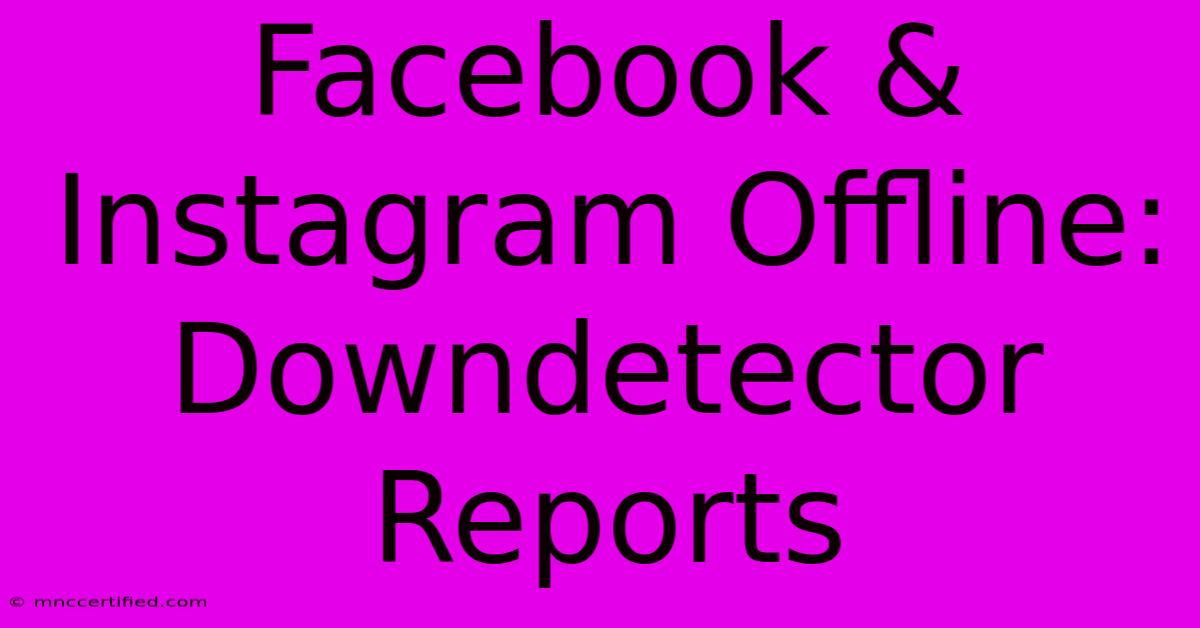Facebook & Instagram Offline: Downdetector Reports

Table of Contents
Facebook & Instagram Offline: Downdetector Reports Surge
Are Facebook and Instagram down? If you're seeing error messages or experiencing connectivity issues with these social media giants, you're not alone. Reports flooding Downdetector, a popular website for tracking online service outages, indicate widespread problems. This article dives into the current situation, exploring potential causes, offering troubleshooting tips, and providing information on how to stay updated on the status of these vital platforms.
Understanding Downdetector Reports
Downdetector aggregates real-time reports from users experiencing issues with various online services. When a significant number of users report problems simultaneously, it signals a potential widespread outage. While Downdetector isn't the official source for outage information (that would be Facebook and Instagram themselves), it provides a valuable early warning system and a sense of the scale of any problems. A spike in reports on Downdetector for Facebook and Instagram usually means something is amiss.
Current Status: Are Facebook and Instagram Down Right Now?
[This section needs to be updated in real-time. You should check Downdetector (downdetector.com) directly for the most up-to-date information on the current status of Facebook and Instagram. Include a screenshot of the Downdetector graph here if possible. Describe the geographical areas most affected and the types of problems reported (e.g., inability to log in, feed not loading, messaging issues). For example: "As of [current time], Downdetector shows a significant surge in reports across North America, with users primarily reporting issues with accessing their news feeds and sending messages." ]
Potential Causes of Facebook and Instagram Outages
Several factors can contribute to widespread outages on platforms as large as Facebook and Instagram:
- Server Issues: Problems with Facebook and Instagram's servers are a common culprit. These can range from hardware failures to software glitches and unexpected spikes in traffic.
- Network Connectivity Problems: Issues with internet service providers (ISPs) or other network infrastructure can prevent users from accessing the platforms.
- DDoS Attacks: Distributed denial-of-service (DDoS) attacks, which flood servers with traffic to overwhelm them, can also cause outages.
- Software Updates: Large-scale software updates can sometimes cause temporary disruptions.
- Planned Maintenance: While less frequent, scheduled maintenance can lead to temporary inaccessibility.
Troubleshooting Tips: What to Do When Facebook or Instagram is Down
While you wait for Facebook and Instagram to resolve the issue, here are some troubleshooting steps you can take:
- Check Your Internet Connection: Ensure your internet is working correctly by trying to access other websites and applications.
- Restart Your Devices: Sometimes a simple restart of your phone, computer, or router can resolve temporary connectivity problems.
- Check Downdetector: Keep an eye on Downdetector for updates on the outage.
- Check Facebook and Instagram's Official Channels: Look for official announcements on their Twitter accounts or help centers.
- Be Patient: Large-scale outages can take time to resolve.
Staying Updated: Following Official Channels
The best way to stay informed about outages and service restoration is to follow the official Facebook and Instagram channels. These platforms typically announce any significant issues and provide updates on their progress towards resolution. [Include links to the official Facebook and Instagram support pages and Twitter accounts here.]
Conclusion
Experiencing a Facebook or Instagram outage can be frustrating, especially given their crucial role in communication and social interaction. By understanding the potential causes, utilizing troubleshooting tips, and staying informed through official channels, you can navigate these situations more effectively. Remember to always rely on official sources for accurate information rather than relying solely on third-party websites like Downdetector.

Thank you for visiting our website wich cover about Facebook & Instagram Offline: Downdetector Reports. We hope the information provided has been useful to you. Feel free to contact us if you have any questions or need further assistance. See you next time and dont miss to bookmark.
Featured Posts
-
Juventus Vs Man City Lineups
Dec 12, 2024
-
Arsenal Defeats Monaco 3 0
Dec 12, 2024
-
Barcelonas Winning Strategy Vs Dortmund
Dec 12, 2024
-
Field Brace Qprs Vital Three Points
Dec 12, 2024
-
Whats App Instagram Facebook Down Widespread Service Disruption
Dec 12, 2024